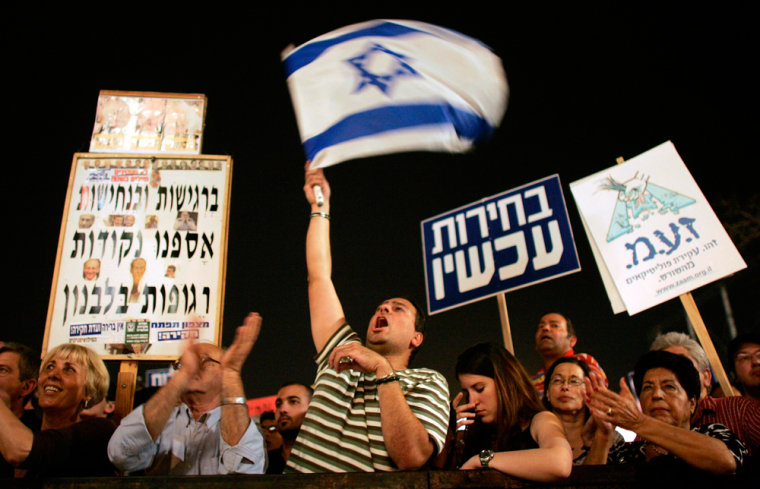Tens of thousands streamed onto a Tel Aviv square after sundown Thursday, demanding that Prime Minister Ehud Olmert resign because of a government inquiry’s scathing criticism of his handling of the inconclusive war in Lebanon last summer.
Olmert remained defiant, hoping to beat back a rising wave of calls to step down. A day after his popular foreign minister joined the chorus, Olmert’s aides argued it was not a mortal political blow but conceded a large-scale public protest campaign could bring him down.
Turnout on the square in front of Tel Aviv’s City Hall appeared to top 100,000, but police refused to estimate the crowd’s size.
The rally drew a cross-section of Israelis — moderates and hard-liners, secular and religious, young and old, a rare mix symbolizing the widespread dissatisfaction with Olmert.
“Failures, Go Home!” read a banner erected behind the podium, where parents of soldiers killed in the conflict were scheduled to speak.
Organizers decided not to let politicians address the crowd to give the gathering a grass-roots feeling, said Uzi Dayan, a retired general. “There are no politicians here, but this is a political event,” he said.
Also addressing the gathering was Moshe Muskal, 50, of the central town of Mazkeret Batya. His son, Rafnael, was killed during the war. “I am glad that the public is not passive or despairing,” he told The Associated Press. He said the soldiers “fulfilled their mission fully. Our mission is to make our country a little bit better.”
Size proportionate with outrage
Some previous Israeli political demonstrations have attracted hundreds of thousands of protesters, and the size of this one was seen as a critical sign of the extent of public anger.
Edan Mehallel, 16, said he came to make a difference. “The more people there are, the more influence the demonstration will have,” he said.
Past protests in the same Tel Aviv square have started political earthquakes. A demonstration after Israel’s hard-fought 1973 war to turn back invasions by Egypt and Syria led to the resignations of legendary Prime Minister Golda Meir and Defense Minister Moshe Dayan.
Alon Davidi and 34 other protesters marched 45 miles to Tel Aviv from the southern town of Sderot, a frequent target of rockets from Palestinian militants in Gaza.
“We want as many people as possible to come to the square and say, ‘Ehud Olmert, go home,”’ Davidi told Israel Army Radio.
Israel went to war against Hezbollah guerrillas in Lebanon on July 12 after guerrillas crossed into Israel, killed three soldiers and captured two others.
For many, a failed war
For many Israelis, the 34-day war was a failure because it didn’t achieve the two main goals Olmert set — returning the soldiers and crushing Hezbollah, which fired nearly 4,000 rockets at northern Israel. The conflict killed 158 Israelis and more than 1,000 Lebanese.
A commission appointed by Olmert to investigate the war turned on its creator, accusing the premier of “hasty” decision-making, failing to consult others and neglecting to assess the chances that his goals could be accomplished.
The report covered only the first six days of the war and the six years that led up to it. A report on the full war is expected in the summer.
Leaders of the ruling Kadima Party rallied around their beleaguered chief Thursday, clearly mindful that a mutiny could lead to new elections that opinion polls indicate would be won by hawkish former Prime Minister Benjamin Netanyahu’s Likud party.
Under Israel’s parliamentary system, Kadima could switch its leader without losing power. The prime minister is not directly elected and usually comes from parliament’s largest bloc.
Israel’s parliament interrupted its spring recess to hold a special session on the war report, where Netanyahu appealed for new elections.
“We must redress the primary flaw the report identifies — the lack of a seasoned leadership, the lack of responsibility, the inability to make tough decisions and carry them out,” he told a sparsely attended session.
Olmert was present in the chamber, but did not speak.
Two more challenges loom
Even if Olmert weathers the current crisis, two upcoming events are expected to pose even greater challenges to his rule: a party primary and the final report on the Lebanon war.
Olmert’s main coalition partner, Labor, is scheduled to hold a May 28 primary for party leader that is expected to oust Defense Minister Amir Peretz, a lesser target of the war inquiry’s criticism. A new Labor leader might well decide to bolt the coalition, which almost certainly would deal a fatal blow to Olmert’s government.
Even Kadima optimists doubted Olmert could stay in power if the final Lebanon report was as harsh as the first one.
Also auguring poorly for Olmert’s political survival is the history of protests at the plaza where protesters massed Thursday night.
In 1982, hundreds of thousands marched to the square to protest Israel’s involvement in the massacre of Palestinian refugees in Beirut by a Christian militia, a step toward the resignation of then-Defense Minister Ariel Sharon and the eventual retirement of Prime Minister Menachem Begin.
In 1995, after a peace rally, Prime Minister Yitzhak Rabin was assassinated in the square by an Israeli opponent of his policy of compromise for peace with the Palestinians. The square was renamed for the fallen leader.
